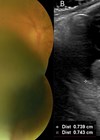The authors highlight the importance of using all available data in the prognostication of uveal melanoma (UM). Over recent years a number of molecular tests have emerged to allow clinicians to predict metastatic potential of UM. However, concordance between techniques and the superiority of one test over the other needs to be questioned. Only a limited number of studies have evaluated the concordance between molecular tests on a given tumour sample. At present two prognostication tests: multiplex ligation-dependent probe amplification (MLPA) and gene expression profiling (GEP) are commercially available. In MLPA, chromosome 3 loss (monosomy 3) and chromosome 8q gain are predictive of a poor prognosis. GEP broadly characterises UM into the low metastatic potential class 1 or the high metastatic risk class 2. A recent study found a 16% discordance between GEP class and monosomy 3 in prognostic fine needle aspirates from UM patients. Furthermore, some of these patients would have been given a contradictory prognosis. Possible explanations for the observed discrepancies between these two commercially validated tests include: tumour heterogeneity and / or testing different biopsy sites of the tumour; sampling error of obtaining non-UM tissue in the aspirate; prognostic superiority of either test cannot be realistically evaluated as the prognostic prediction was not correlated with patient survival; and class 1 GEP tumours with monosomy 3 may represent a further subset of tumours with a tendency for late metastases (Class 1b). Studies with long-term follow-up are therefore warranted. Although current molecular testing offers significant improvement in prognostication in primary UM, this is a rapidly advancing field and clinicians need to consider all available data in addition to the clinical and histomorphological UM features when predicting metastatic potential and recommending patient management. Patients with a good prognosis should still be under periodic surveillance due to risk of late metastases, and a fatalistic view should not be upheld in a patient with a poor prognosis.
Prognostication for uveal melanoma
Reviewed by Yamini Krishna
Prognostication for uveal melanoma: are two tests better than one?
CONTRIBUTOR
Yamini Krishna
Liverpool University Hospitals NHS Foundation Trust, UK.
View Full Profile




